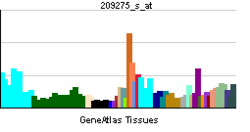CLN3
This article is about the human gene. For other uses, see Cln3 (disambiguation).
| View/Edit Human | View/Edit Mouse |
Battenin is a protein that in humans is encoded by the CLN3 gene located on chromosome 16.[3][4]
Function
Battenin is involved in lysosomal function. Many alternatively spliced transcript variants have been found for this gene.[4]
Clinical significance
Mutations in this gene, as well as other neuronal ceroid-lipofuscinosis (CLN) genes, cause neurodegenerative diseases commonly known as Batten disease, also known as Juvenile Neuronal Ceroid Lipofuscinosis (JNCL) or Juvenile Batten disease.
References
- ↑ "Human PubMed Reference:".
- ↑ "Mouse PubMed Reference:".
- ↑ Rusyn E, Mousallem T, Persaud-Sawin DA, Miller S, Boustany RM (Jun 2008). "CLN3p impacts galactosylceramide transport, raft morphology, and lipid content". Pediatr Res. 63 (6): 625–31. doi:10.1203/PDR.0b013e31816fdc17. PMID 18317235.
- 1 2 "Entrez Gene: CLN3 ceroid-lipofuscinosis, neuronal 3, juvenile (Batten, Spielmeyer-Vogt disease)".
Further reading
- Dawson G, Cho S (2000). "Batten's disease: clues to neuronal protein catabolism in lysosomes". J. Neurosci. Res. 60 (2): 133–40. doi:10.1002/(SICI)1097-4547(20000415)60:2<133::AID-JNR1>3.0.CO;2-3. PMID 10740217.
- Vesa J, Peltonen L (2003). "Mutated genes in juvenile and variant late infantile neuronal ceroid lipofuscinoses encode lysosomal proteins". Curr. Mol. Med. 2 (5): 439–44. doi:10.2174/1566524023362311. PMID 12125809.
- Phillips SN, Benedict JW, Weimer JM, Pearce DA (2005). "CLN3, the protein associated with batten disease: structure, function and localization". J. Neurosci. Res. 79 (5): 573–83. doi:10.1002/jnr.20367. PMID 15657902.
- "Isolation of a novel gene underlying Batten disease, CLN3. The International Batten Disease Consortium". Cell. 82 (6): 949–57. 1995. doi:10.1016/0092-8674(95)90274-0. PMID 7553855.
- Taschner PE, de Vos N, Thompson AD, et al. (1995). "Chromosome 16 microdeletion in a patient with juvenile neuronal ceroid lipofuscinosis (Batten disease)". Am. J. Hum. Genet. 56 (3): 663–8. PMC 1801154
 . PMID 7887420.
. PMID 7887420. - Janes RW, Munroe PB, Mitchison HM, et al. (1997). "A model for Batten disease protein CLN3: functional implications from homology and mutations". FEBS Lett. 399 (1–2): 75–7. doi:10.1016/S0014-5793(96)01290-2. PMID 8980123.
- Järvelä I, Mitchison HM, Munroe PB, et al. (1997). "Rapid diagnostic test for the major mutation underlying Batten disease". J. Med. Genet. 33 (12): 1041–2. doi:10.1136/jmg.33.12.1041. PMC 1050819
 . PMID 9004140.
. PMID 9004140. - Mitchison HM, Munroe PB, O'Rawe AM, et al. (1997). "Genomic structure and complete nucleotide sequence of the Batten disease gene, CLN3". Genomics. 40 (2): 346–50. doi:10.1006/geno.1996.4576. PMID 9119403.
- Munroe PB, Mitchison HM, O'Rawe AM, et al. (1997). "Spectrum of mutations in the Batten disease gene, CLN3". Am. J. Hum. Genet. 61 (2): 310–6. doi:10.1086/514846. PMC 1715900
 . PMID 9311735.
. PMID 9311735. - Järvelä I, Sainio M, Rantamäki T, et al. (1998). "Biosynthesis and intracellular targeting of the CLN3 protein defective in Batten disease". Hum. Mol. Genet. 7 (1): 85–90. doi:10.1093/hmg/7.1.85. PMID 9384607.
- Wisniewski KE, Zhong N, Kaczmarski W, et al. (1998). "Compound heterozygous genotype is associated with protracted juvenile neuronal ceroid lipofuscinosis". Ann. Neurol. 43 (1): 106–10. doi:10.1002/ana.410430118. PMID 9450775.
- Zhong N, Wisniewski KE, Kaczmarski AL, et al. (1998). "Molecular screening of Batten disease: identification of a missense mutation (E295K) in the CLN3 gene". Hum. Genet. 102 (1): 57–62. doi:10.1007/s004390050654. PMID 9490299.
- Kremmidiotis G, Lensink IL, Bilton RL, et al. (1999). "The Batten disease gene product (CLN3p) is a Golgi integral membrane protein". Hum. Mol. Genet. 8 (3): 523–31. doi:10.1093/hmg/8.3.523. PMID 9949212.
- Haskell RE, Derksen TA, Davidson BL (1999). "Intracellular trafficking of the JNCL protein CLN3". Mol. Genet. Metab. 66 (4): 253–60. doi:10.1006/mgme.1999.2802. PMID 10191111.
- Kaczmarski W, Wisniewski KE, Golabek A, et al. (1999). "Studies of membrane association of CLN3 protein". Mol. Genet. Metab. 66 (4): 261–4. doi:10.1006/mgme.1999.2833. PMID 10191112.
- Golabek AA, Kaczmarski W, Kida E, et al. (1999). "Expression studies of CLN3 protein (battenin) in fusion with the green fluorescent protein in mammalian cells in vitro". Mol. Genet. Metab. 66 (4): 277–82. doi:10.1006/mgme.1999.2836. PMID 10191115.
- Margraf LR, Boriack RL, Routheut AA, et al. (1999). "Tissue expression and subcellular localization of CLN3, the Batten disease protein". Mol. Genet. Metab. 66 (4): 283–9. doi:10.1006/mgme.1999.2830. PMID 10191116.
- Järvelä I, Lehtovirta M, Tikkanen R, et al. (1999). "Defective intracellular transport of CLN3 is the molecular basis of Batten disease (JNCL)". Hum. Mol. Genet. 8 (6): 1091–8. doi:10.1093/hmg/8.6.1091. PMID 10332042.
- Loftus BJ, Kim UJ, Sneddon VP, et al. (1999). "Genome duplications and other features in 12 Mb of DNA sequence from human chromosome 16p and 16q". Genomics. 60 (3): 295–308. doi:10.1006/geno.1999.5927. PMID 10493829.
- Pane MA, Puranam KL, Boustany RM (2004). "Expression of cln3 in human NT2 neuronal precursor cells and neonatal rat brain". Pediatr. Res. 46 (4): 367–74. doi:10.1203/00006450-199910000-00003. PMID 10509355.
- Phillips S, Benedict J, Weimer J, Pearce D (2005). "CLN3, the protein associated with batten disease: structure, function and localization". J Neurosci Res. 79 (5): 573–83. doi:10.1002/jnr.20367. PMID 15657902.
External links
- CLN3 protein, human at the US National Library of Medicine Medical Subject Headings (MeSH)
- GeneReviews/NCBI/NIH/UW entry on Neuronal Ceroid-Lipofuscinoses
This article is issued from Wikipedia - version of the 5/28/2016. The text is available under the Creative Commons Attribution/Share Alike but additional terms may apply for the media files.

